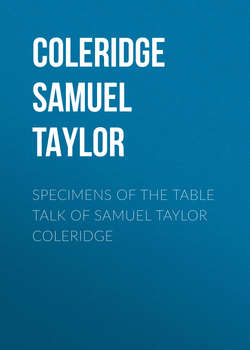Читать книгу Specimens of the Table Talk of Samuel Taylor Coleridge - Coleridge Samuel Taylor - Страница 48
TABLE TALK
May 12. 1830
ОглавлениеSHAKSPEARE.—MILTON.—HOMER
Shakspeare is the Spinosistic deity—an omnipresent creativeness. Milton is the deity of prescience; he stands ab extra, and drives a fiery chariot and four, making the horses feel the iron curb which holds them in. Shakspeare's poetry is characterless; that is, it does not reflect the individual Shakspeare; but John Milton himself is in every line of the Paradise Lost. Shakspeare's rhymed verses are excessively condensed,– epigrams with the point every where; but in his blank dramatic verse he is diffused, with a linked sweetness long drawn out. No one can understand Shakspeare's superiority fully until he has ascertained, by comparison, all that which he possessed in common with several other great dramatists of his age, and has then calculated the surplus which is entirely Shakspeare's own. His rhythm is so perfect, that you may be almost sure that you do not understand the real force of a line, if it does not run well as you read it. The necessary mental pause after every hemistich or imperfect line is always equal to the time that would have been taken in reading the complete verse.
* * * * *
I have no doubt whatever that Homer is a mere concrete name for the rhapsodies of the Iliad.49 Of course there was a Homer, and twenty besides. I will engage to compile twelve books with characters just as distinct and consistent as those in the Iliad, from the metrical ballads, and other chronicles of England, about Arthur and the Knights of the Round Table. I say nothing about moral dignity, but the mere consistency of character. The different qualities were traditional. Tristram is always courteous, Lancelot invincible, and so on. The same might be done with the Spanish romances of the Cid. There is no subjectivity whatever in the Homeric poetry. There is a subjectivity of the poet, as of Milton, who is himself before himself in everything he writes; and there is a subjectivity of the persona, or dramatic character, as in all Shakspeare's great creations, Hamlet, Lear, &c.
49
Mr. Coleridge was a decided Wolfian in the Homeric question; but he had never read a word of the famous Prolegomena, and knew nothing of Wolf's reasoning, but what I told him of it in conversation. Mr. C. informed me, that he adopted the conclusion contained in the text upon the first perusal of Vico's Scienza Nuova; "not," he said, "that Vico has reasoned it out with such learning and accuracy as you report of Wolf, but Vico struck out all the leading hints, and I soon filled up the rest out of my own head."– ED.
